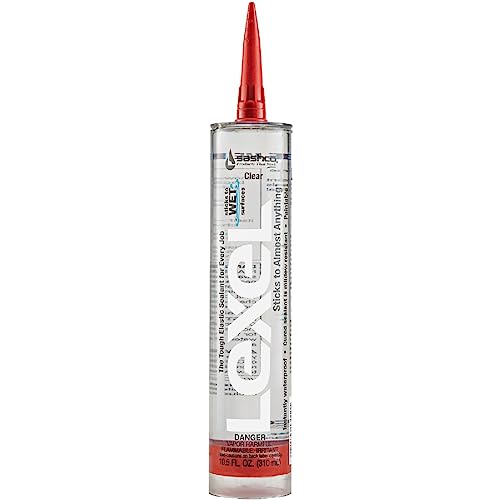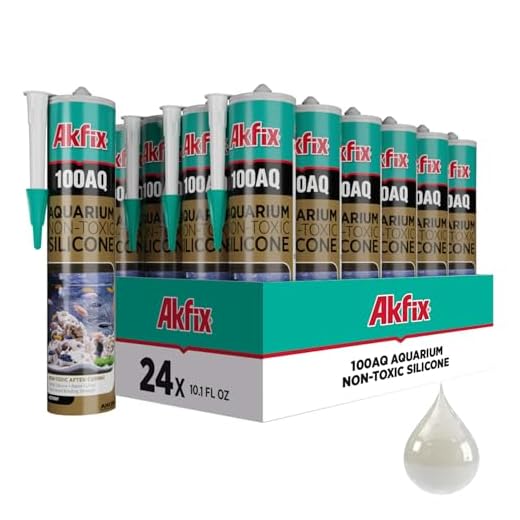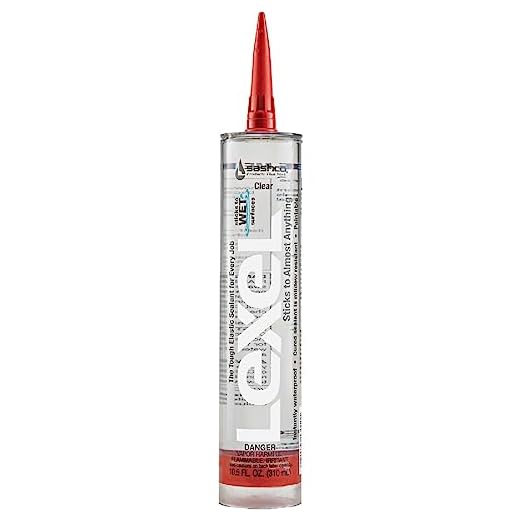Reef
Blog
Is lexel safe for aquariums

Aquarium hobbyists often use sealants to ensure that their tanks are watertight and secure. One popular sealant on the market is Lexel, which boasts its versatility and strength in creating long-lasting bonds. However, many aquarists wonder if Lexel is safe to use in their aquariums, as the well-being of their aquatic pets is of utmost importance.
Lexel is not specifically designed or labelled for aquarium use. As a result, it is advisable to proceed with caution and consider other options that are explicitly formulated for underwater applications. While Lexel may be a suitable choice for some non-aquatic projects, there are potential risks associated with using it in a fish tank.
One concern with using Lexel in an aquarium is its chemical composition. The sealant contains ingredients that may release toxins into the water over time, posing a threat to the health of the aquatic ecosystem. Additionally, Lexel may not fully cure or harden when submerged in water, allowing it to break down or disintegrate more easily compared to aquarium-specific sealants.
It is strongly recommended to use sealants that are explicitly labelled for aquarium use. These sealants are formulated to be non-toxic and safe for both fish and other aquatic life. They are designed to withstand the constant immersion in water and provide a secure and lasting seal.
In conclusion, while Lexel may have its advantages for other applications, it is not recommended for use in aquariums due to potential risks to the aquatic environment and the well-being of the fish. It is best to use sealants that are specifically designed for aquariums to ensure the safety and longevity of your aquatic pets.
What is Lexel?
Lexel is a brand of adhesive sealant that is commonly used in aquariums. It is a clear, flexible, and strong sealant that provides excellent adhesion and durability.
Lexel is specifically designed to create watertight seals in aquariums, making it a popular choice among aquarium enthusiasts and professionals. It can be used to bond and seal various materials such as glass, plastic, and ceramics.
One of the key features of Lexel is its ability to remain flexible even after curing. This flexibility allows for natural movement in the aquarium, preventing the sealant from cracking or breaking over time.
Lexel is also known for its high resistance to water, humidity, and temperature changes. This makes it ideal for use in environments with constant exposure to water, such as aquariums.
Furthermore, Lexel has a low odor and contains no volatile organic compounds (VOCs). This means that it is safe to use in enclosed spaces, such as aquariums, without causing harm to aquatic life.
In summary, Lexel is a reliable and safe adhesive sealant that is widely used in aquariums. Its flexibility, durability, and resistance to water make it an excellent choice for creating and maintaining watertight seals in aquarium setups.
Is Lexel safe for aquariums?
Lexel is a versatile adhesive and sealant that is commonly used in various applications, including aquariums. It is known for its strong bonding properties and its ability to create a watertight seal. However, before using Lexel in your aquarium, it is important to consider its safety for aquatic life.
While Lexel is generally considered safe for aquarium use, it is always recommended to check the product’s label and consult with the manufacturer to ensure that it is suitable for your specific aquarium setup. Some factors to consider include the type of fish and plants in your aquarium, as well as any specific requirements or sensitivities they may have.
Lexel is a solvent-based adhesive, meaning it contains chemicals that can potentially leach into the water. It is important to allow the product to cure completely before adding it to the aquarium to ensure that any potentially harmful substances have evaporated. Curing time can vary depending on factors such as temperature and humidity, so it is advised to follow the manufacturer’s instructions.
Additionally, it is recommended to apply Lexel to the outside of the aquarium rather than the inside, as this minimizes the chances of the adhesive coming into direct contact with the water and aquatic life. This can help further ensure the safety of your aquarium inhabitants.
| Pros | Cons |
|---|---|
| Creates a strong bonding and watertight seal | Potential risk of chemicals leaching into the water |
| Versatile and suitable for various applications | Requires curing time before introducing to the aquarium |
| Easily available in the market | Recommended for external use on the aquarium |
In conclusion, while Lexel can be used in aquariums, it is important to take necessary precautions and ensure its safety for your specific aquarium setup. Always follow the manufacturer’s instructions and consult with professionals if you have any concerns about its use in your aquarium.
Benefits of using Lexel in aquariums
Lexel is a versatile sealant that can provide numerous benefits when used in aquariums. Whether you are setting up a new aquarium or maintaining an existing one, Lexel offers several advantages that make it a superior choice compared to other sealants.
Here are some of the key benefits of using Lexel in aquariums:
| 1. Waterproof Seal: | Lexel forms a durable and waterproof seal, ensuring that no water leaks occur. This is crucial for maintaining the ideal water conditions in the aquarium and preventing any damage to the surrounding area. |
| 2. Non-Toxic: | Lexel is specifically formulated to be safe for aquatic life. It does not release any harmful toxins or chemicals into the water, making it an excellent choice for fish, plants, and other aquatic organisms. |
| 3. Flexibility: | Unlike many other sealants, Lexel remains flexible even after curing. It can withstand the natural movements and vibrations of the aquarium, preventing any cracks or gaps from forming over time. |
| 4. Clarity: | Lexel has excellent clarity, which ensures that it does not obstruct the view of the aquarium. This is particularly important for display tanks and enhances the overall aesthetic appeal. |
| 5. Easy Application: | Lexel is easy to apply and adheres well to a variety of surfaces, including glass, ceramic, and plastic. It can be used for sealing seams, joints, and cracks, making it ideal for various aquarium applications. |
| 6. Longevity: | Lexel is designed to withstand the harsh conditions of aquarium environments, including exposure to water, high humidity, and fluctuations in temperature. It offers excellent resistance to yellowing, cracking, and degradation over time. |
Overall, Lexel is a reliable and safe sealant for aquariums, providing a range of benefits such as waterproofing, non-toxicity, flexibility, clarity, easy application, and longevity. Its use can help ensure the longevity and health of your aquarium, creating a safe and visually appealing environment for your aquatic pets.
How to apply Lexel in aquariums
When it comes to sealing aquariums, Lexel is a safe and effective option. Here are some steps to follow when applying Lexel to ensure a leak-free and secure seal.
1. Clean the surfaces: Before applying Lexel, ensure that the surfaces to be sealed are clean and dry. Remove any debris, algae, or old sealant from the area.
2. Apply Lexel: Squeeze a small amount of Lexel onto a disposable surface, such as a scrap piece of cardboard or plastic. Using a caulk gun or your fingers, apply a thin and even bead of Lexel along the intended seal line.
3. Smooth and shape the seal: After applying Lexel, use a caulk smoothing tool or your finger to smooth and shape the seal. This will help to create a neat and professional-looking finish.
4. Let it cure: Allow the Lexel sealant to cure fully before introducing water or fish into the aquarium. This typically takes around 24 hours, but it’s essential to refer to the manufacturer’s instructions for specific curing times.
5. Test for leaks: Once the Lexel has cured, fill the aquarium with water and monitor it for any signs of leaks. If you notice any leaks, you may need to reapply Lexel in the affected areas.
Note: Lexel is designed to be safe for aquarium use, but it’s always a good idea to consult the manufacturer’s guidelines and ensure the product is suitable for your specific aquarium setup.
By following these steps and using Lexel correctly, you can confidently seal your aquarium and provide a secure and leak-free environment for your aquatic pets.
Tips for using Lexel in aquariums
Lexel is a popular adhesive sealant that can be safely used in aquariums. It provides a strong and durable bond, ensuring that your aquarium remains leak-free. To use Lexel effectively in your aquarium, consider the following tips:
Clean the surfaces
Before applying Lexel, make sure to thoroughly clean the surfaces that need to be sealed. Use a mild detergent and warm water to remove any dirt, grime, or residue. This will ensure proper adhesion and a long-lasting seal.
Apply in a well-ventilated area
Lexel has a strong odor, so it is important to apply it in a well-ventilated area. Open windows or use fans to improve air circulation. This will prevent the odor from lingering and potentially affecting the health of your fish.
Tip: If possible, consider sealing the aquarium outdoors to minimize exposure to the odor.
Apply the Lexel
Squeeze a small amount of Lexel onto a caulk gun or directly onto the surface you want to seal. Use a steady hand to apply a thin, even bead along the seams or cracks. Smooth the Lexel with a caulk smoothing tool or a damp sponge to create a neat finish.
Tip: Apply the Lexel in smaller sections, working from one side of the aquarium to the other. This will ensure that you have enough time to smooth the sealant before it starts to dry.
Allow proper curing time
Lexel typically takes 24 hours to fully cure. During this time, ensure that your aquarium is empty and that no water is added. This will allow the Lexel to dry and form a strong bond. Once the cure time is complete, you can refill your aquarium and resume normal operation.
Note: It is essential to follow the manufacturer’s instructions for Lexel application and curing times to ensure the best results.
By following these tips, you can safely and effectively use Lexel in your aquarium to create a secure and watertight seal.
“Question-Answer”
Can I use Lexel sealant in my aquarium?
Yes, Lexel sealant is safe to use in aquariums. It does not contain any harmful chemicals that could harm aquatic life.
Is Lexel sealant waterproof?
Yes, Lexel sealant is waterproof. It forms a strong, flexible seal that is resistant to water and moisture.
How long does it take for Lexel sealant to dry?
Lexel sealant typically dries to the touch in about 20 minutes, but it may take up to 24 hours to fully cure. It is recommended to wait at least 24 hours before exposing the sealant to water or other liquids.
Can Lexel sealant be used to repair a leak in an aquarium?
Yes, Lexel sealant can be used to repair leaks in aquariums. It is a strong adhesive that can effectively bond most materials used in aquarium construction, such as glass, plastic, and silicone. However, it is important to ensure that the area to be repaired is clean and dry before applying the sealant.
Is Lexel sealant safe for fish and other aquatic animals?
Yes, Lexel sealant is considered to be safe for fish and other aquatic animals. It does not release any toxic substances into the water and is specifically formulated to be aquarium-safe.



